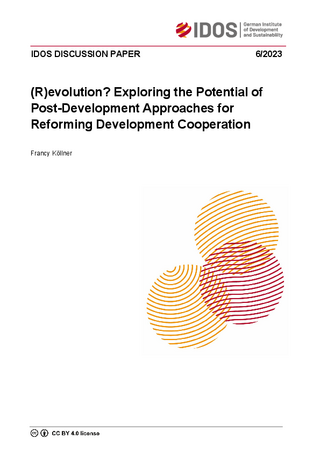(R)evolution? Exploring the potential of post-development approaches for reforming development cooperation
Köllner, FrancyDiscussion Paper (6/2023)
Bonn: German Institute of Development and Sustainability (IDOS)
ISBN: 978-3-96021-207-2
DOI: https://doi.org/10.23661/idp6.2023
Preis: 6 €
The concept and mainstream approaches of development cooperation (DC) have been criticised since the early beginning of their existence. Post-development (PD) scholars have been criticising international DC since 1990 for both its Western perspective and the lack of reflection on asymmetrical power structures. Since also today DC has to face a variety of criticisms, we perceive PD approaches as a starting point for efforts towards change. We asked (1) to what extent and how elements of post-development approaches are reflected in the current policy initiatives of international DC, and (2) what potential do PD approaches have to reform DC. We analysed three examples: German feminist development policy (FemDP) as a relatively new idea of transformation, the locally led development approach as a long-standing concept and Global Public Investment (GPI) as an approach towards a new concept of international cooperation. By means of a content analysis, four commonly used PD elements were selected and slightly adapted to examine whether and how the three policy initiatives acknowledge PD aspects in order to reform DC: (1) the concept of alternatives to development, (2) pluralism of knowledge and power dynamics, (3) user-centred approaches and a critical stance towards the established scientific discourse and (4) the promotion of grassroots movements and local ownership. We discovered a variation in the use of the different PD elements. Although aspects related to power relations, post-colonial structures and knowledge management are prominent in all three initiatives, elements such as grassroots movements are given less consideration in all three cases. Even though FemDP does not focus on an alternative to development, as defined by PD approaches, it puts a strong emphasis on a transformative approach when it comes to its user-centred empowerment and tackles power imbalances by approaching decolonisation. Subsequently, the efforts of German Development Minister Svenja Schulze do not just describe a rhetorical reorientation but involve actual transformative efforts. However, further implementation efforts need to be analysed. The locally led development approach seems to be a suitable springboard for the inclusion of local knowledge and grassroots movements. Whereas the approach mostly uses descriptions of change as a means to reach its objectives, the GPI concept in particular uses PD elements as a reformative approach, as per the PD definition, putting the objective of the transformation of international public finance in international cooperation at its centre. Valuing PD approaches, we conclude that they do influence public initiatives in one way or another. In the future, if inner-systemic change should become an option, we see the greatest added value when PD scholars succeed in underpinning their approaches with instruments that can be used as tools in DC practice.

